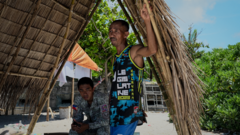A newly released report from the Justice Department findings has surfaced allegations that F.B.I. agents engaged in sexual activities with prostitutes in various Southeast Asian countries, contradicting the agency's commitment to combatting human trafficking. This investigation spans from 2009 to 2018 and outlines how misconduct occurred during training sessions aimed at preventing the very exploitation these agents were supposed to combat. The details revealed significant lapses in ethics, prompting scrutiny of the agents’ behaviors while stationed abroad.
F.B.I. Agents' Disturbing Conduct in Southeast Asia: Report Reveals Exploitation Issues

F.B.I. Agents' Disturbing Conduct in Southeast Asia: Report Reveals Exploitation Issues
A Justice Department report highlights troubling misconduct among F.B.I. agents stationed in Southeast Asia, raising serious ethical concerns about human trafficking awareness.
F.B.I. agents in Southeast Asia allegedly participated in illicit sexual activities with prostitutes despite the agency prioritizing the fight against human trafficking. Reports indicate this misconduct happened during their time in Cambodia, the Philippines, and Thailand, particularly as they attended training sessions focused on addressing these issues. According to the findings made public in a lawsuit, the agents paid for sexual services while socializing with their peers and local police, indicating a disregard for both local laws and their professional duties.
The previously undisclosed document sheds light on the agents' actions during official events and conferences, revealing the apparent hypocrisy of their roles. The practice of prostitution, though commonplace in these regions, is illegal, and despite the F.B.I.’s strict rules against employees engaging in such behavior, the agents reportedly violated these policies and partook in negotiations for sex. Notably, these events coincide with training sessions held by the Royal Thai Police to combat human trafficking, underscoring the conflicting messages being sent by F.B.I. personnel.
Those familiar with the situation have expressed concern over the implications of the agents' actions on their credibility and the broader mission to combat human trafficking. As the agency looks to strengthen its image under new leadership, these revelations come at a critical time. The F.B.I. has been criticized for failing to adequately address such misconduct, and the potential impact on its objectives in battling sex trafficking remains to be seen.
The F.B.I. has not yet issued a formal response to the report, as public scrutiny intensifies regarding the conduct of its agents abroad. This issue raises broader questions about the responsibilities of law enforcement officers, their adherence to ethical standards, and the implications of their actions on the global fight against exploitation and trafficking.
As this story continues to develop, experts call for greater accountability within law enforcement agencies and a reinforcement of ethical standards to prevent similar incidents in the future.
The previously undisclosed document sheds light on the agents' actions during official events and conferences, revealing the apparent hypocrisy of their roles. The practice of prostitution, though commonplace in these regions, is illegal, and despite the F.B.I.’s strict rules against employees engaging in such behavior, the agents reportedly violated these policies and partook in negotiations for sex. Notably, these events coincide with training sessions held by the Royal Thai Police to combat human trafficking, underscoring the conflicting messages being sent by F.B.I. personnel.
Those familiar with the situation have expressed concern over the implications of the agents' actions on their credibility and the broader mission to combat human trafficking. As the agency looks to strengthen its image under new leadership, these revelations come at a critical time. The F.B.I. has been criticized for failing to adequately address such misconduct, and the potential impact on its objectives in battling sex trafficking remains to be seen.
The F.B.I. has not yet issued a formal response to the report, as public scrutiny intensifies regarding the conduct of its agents abroad. This issue raises broader questions about the responsibilities of law enforcement officers, their adherence to ethical standards, and the implications of their actions on the global fight against exploitation and trafficking.
As this story continues to develop, experts call for greater accountability within law enforcement agencies and a reinforcement of ethical standards to prevent similar incidents in the future.




















